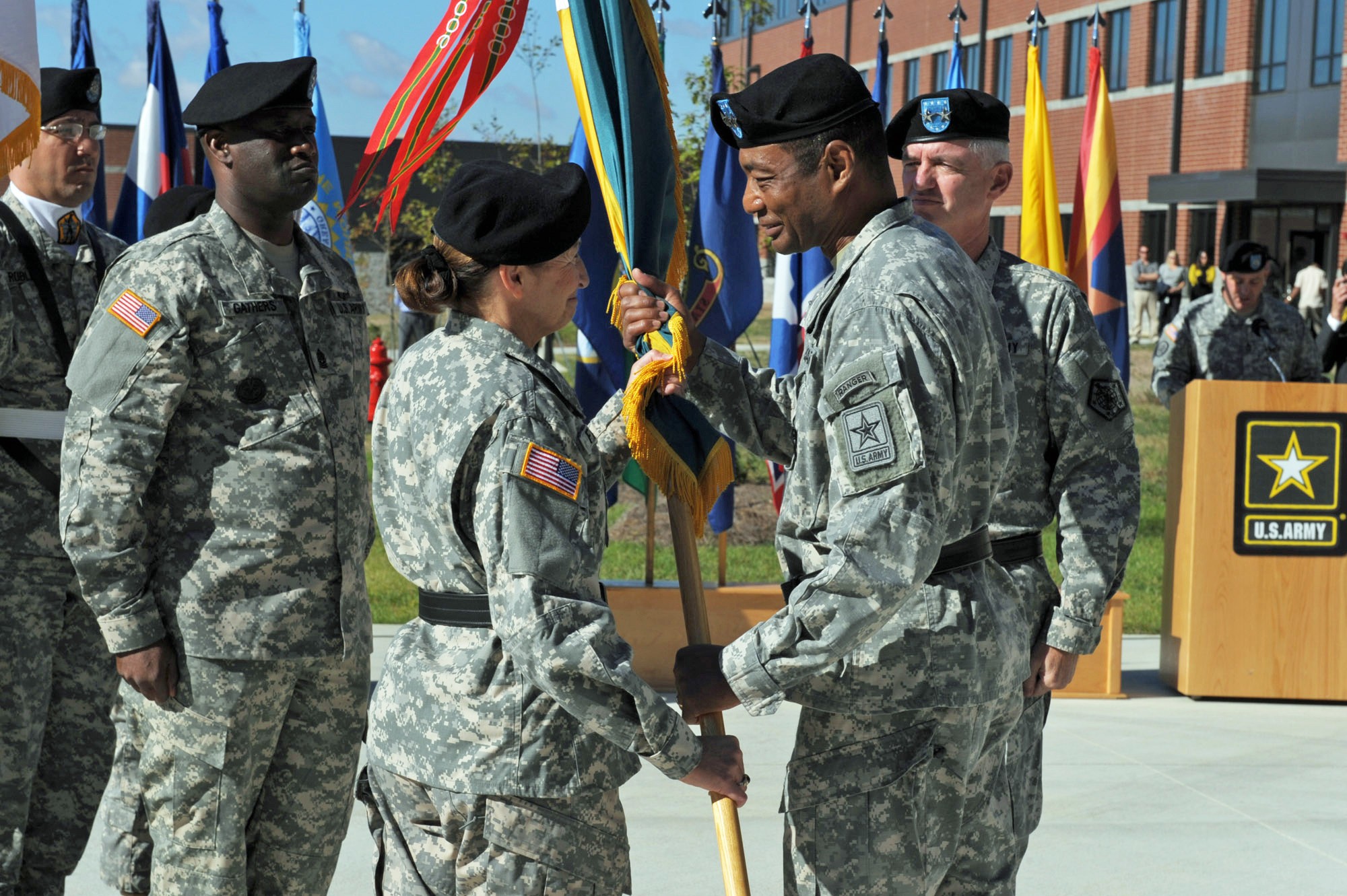FORT KNOX, Ky. (Oct. 14, 2010) -- A Soldier played a drum roll crisply on a snare drum. After slow-marching "Every Other Left" from the back of the assembly, the Department of the Army Select Honor Guard stepped deliberately in a maneuver that deftly turned its Soldiers and the flags they carried to face the audience. A light breeze blew steadily so that the American flag unfurled and battle streamers on the Army flag fluttered.
The U.S. Army Human Resources Command was about to witness a time-honored tradition, marking the HRC's first change of command at its new home.
Outgoing HRC Commander Maj. Gen. Sean J. Byrne passed the flag during a change-of-command ceremony in the quad of the Lt. Gen. Timothy J. Maude Complex here this morning, and incoming HRC commander, Maj. Gen. Gina S. Farrisee, assumed command.
The passing of the flag from the command sergeant major to the outgoing commander to the Deputy Chief of Staff, Army G-1, to the incoming commander and, lastly, to the command sergeant major is a circuit that signifies the importance of the continuum of leadership.
This is the first HRC change of command to take place at Fort Knox since HRC's move began this past summer under Base Realignment and Closure, or BRAC. The move is relocating operations from HRC sites in three different locations -- Alexandria, Va.; St. Louis and Indianapolis.
The new commander is also HRC's first female commanding general. Maj. Gen. Gina S. Farrisee comes to the U.S. Army Human Resources Command from Army G-1, Washington, D.C., where her assignment was director of Military Personnel Management.
Farrisee is no stranger to HRC: She served with honor as the 61st adjutant general of the Army, U.S. Army Human Resources Command.
Among the honored guests were Assistant Secretary of the Army for Manpower and Reserve Affairs Thomas Lamont; retired Lt. Gen. David Henry Ohle and retired Lt. Gen. Michael D. Rochelle, both of whom once held the position of Army G-1 (Administration/Personnel); and Jerry Cecil and Clarissa Freeman, both civilian aides to the secretary of the Army from Kentucky.
Also in attendance was Teri Maude, widow of Lt. Gen. Timothy J. Maude, who died Sept. 11, 2001, in the terrorist attack on the Pentagon. The Maude Complex, now the home of HRC, was named for Maude, who was serving as the U.S. Army deputy chief of staff for Personnel (G-1) at the time of the attack.
At one point in the ceremony, the commanders' spouses were given gifts to show how highly they were prized for the way they supported their Soldier-spouses and helped them complete the mission time and time again.
Byrne's wife, Chris, was given red roses, symbolizing her dedication and sacrifice throughout Byrne's years as a Soldier.
Farrisee's husband, retired Army Col. David G. Farrisee, was given a bottle of a beverage distilled in Kentucky, because he has ties to Kentucky: He has family in the Louisville area and in Frankfort, Ky. He calls Frankfort home.
"During a period of continuous combat operations over the past four years, Sean [Maj. Gen. Byrne] and his team have performed brilliantly, ensuring the combat power of our formations into Iraq and Afghanistan," said Lt. Gen. Thomas P. Bostick, deputy chief of staff, Army G-1.
" This period has seen the largest movement of U.S. forces since the Second World War. In all, the Soldiers and civilian professionals of HRC have been directly involved in the deployment of some 250,000 Soldiers," Bostick said.
"He also supported the transition of our Army from a linear, division-based deployment model to a rotational, brigade-based force; and then subsequently led the revamping of countless policies to better support commanders and to provide improved quality of life and predictability for our Soldiers and families."
Bostick then focused his remarks on the incoming HRC commander.
"Anyone who knows General Farrisee knows she has earned a tremendous reputation for diligence, unbounded energy and common sense," he said. "One thing that I know for certain: The Army can count on Gina to apply her vast talents and experience to support commanders in meeting emerging operational challenges; assessing and retaining a highly talented, agile force; and ensuring the highest possible quality of life for our Soldiers and Families."
The outgoing HRC commander took his turn at the podium and addressed the Fort Knox community.
"I appreciate your support as we completed our journey to Fort Knox," Byrne said. "I'm revisiting my Kentucky roots. I actually started my Army career here."
The pace is the greatest it's been since World War II, he said. The people of HRC make sure America's Soldiers are deployed with the right force and the right leaders to be successful.
Farrisee thanked the HRC work force for a warm welcome, and she thanked Bostick for his confidence in her.
"I accept the responsibilities inherent in commanding this great organization," Farrisee said. "I am privileged to return to the great HRC team and have the opportunity to serve with many of you again.
"This command will continue its excellence in executing the full spectrum of human-resources programs, services and systems to support the readiness and well-being of Army personnel and their families worldwide," she said.
(Andrea Wales writes for the U.S. Army Human Resources Command Public Affairs Office.)


Social Sharing